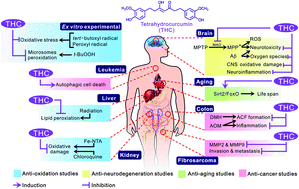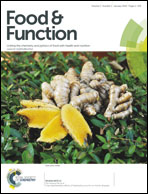Chemopreventative effects of tetrahydrocurcumin on human diseases
Abstract
Chemoprevention is a relatively new and promising strategy to prevent human degenerative diseases, including cancer, and is defined as the use of natural dietary compounds and/or synthetic substances to block, inhibit, reverse, or retard the progress of human diseases. Tetrahydrocurcumin (THC) is a major metabolite of curcumin (extracted from the roots of the Curcuma longa Linn). THC has been demonstrated to prevent oxidative stress and inflammation, to act against neurodegeneration, and to possess anti-cancer activity. In this review, we summarize the current knowledge and underlying molecular mechanisms of the chemopreventative activities of THC and its potential effects on the development of various human diseases.


 Please wait while we load your content...
Please wait while we load your content...